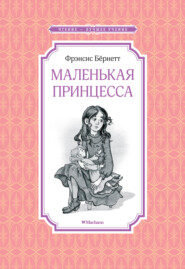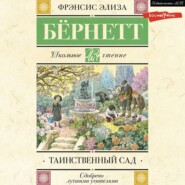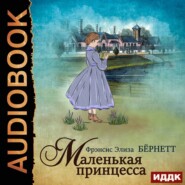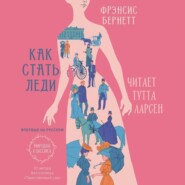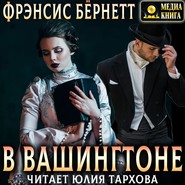По всем вопросам обращайтесь на: info@litportal.ru
(©) 2003-2024.
✖
Маленький Лорд Фаунтлерой. Уровень 1 / Little Lord Fauntleroy
Настройки чтения
Размер шрифта
Высота строк
Поля
“I would not forget you, whoever I was among,” answered his lordship. “I’ve spent my happiest hours with you; at least, some of them. I hope you’ll come to see me sometime. I’m sure my grandpapa would be very much pleased.”
“I’d come to see you,” replied Mr. Hobbs.
At last all the preparations were complete; the day came when the trunks were taken to the steamer. It was just at the very last, when someone hurriedly forcing his way through people came toward Cedric. It was a boy, with something red in his hand. It was Dick. He came up to Cedric quite breathless.
“I’ve run all the way,” he said. “I’ve come down to see you. Trade’s been prime! I bought this for you out of what I made yesterday. You can wear it when you get among the swells[45 - when you get among the swells – когда будешь среди важных шишек]. It’s a handkerchief.”
He poured it all forth as if in one sentence. A bell rang, and he made a leap away before Cedric had time to speak.
“Goodbye!” he panted. “Wear it when you get among the swells.” And he darted off[46 - darted off – бросился прочь] and was gone.
Cedric held the handkerchief in his hand. It was of bright red silk ornamented with purple horseshoes and horses’ heads.
Little Lord Fauntleroy leaned forward and waved the red handkerchief.
“Goodbye, Dick!” he shouted, lustily. “Thank you! Goodbye, Dick!”
And the big steamer moved away, and the people cheered again, and Cedric’s mother drew the veil over her eyes.
It was during the voyage that Cedric’s mother told him that his home was not to be hers; and when he first understood it, his grief was so great that Mr. Havisham saw that the Earl had been wise in making the arrangements that his mother should be quite near him, and see him often. But his mother managed the little fellow so sweetly and lovingly, and made him feel that she would be so near him, that, after a while, he forgot any fear.
He could not but feel puzzled by such a strange state of affairs, which could put his “Dearest” in one house and himself in another. The fact was that Mrs. Errol had thought it better not to tell him why this plan had been made.
“I prefer he should not be told,” she said to Mr. Havisham. “He would not really understand; he would only be shocked and hurt; and I feel sure that his feeling for the Earl will be a more natural one if he does not know that his grandfather dislikes me so bitterly. It is better for him that he should not be told until he is much older, and it is far better for the Earl. It would make a barrier between them, even though Ceddie is such a child.”
So Cedric only knew that there was some mysterious reason for the arrangement, some reason which he was not old enough to understand, but which would be explained when he was older.
It was eleven days after he had said goodbye to his friend Dick before he reached Liverpool; and it was on the night of the twelfth day that the carriage in which he and his mother and Mr. Havisham had driven from the station stopped before the gates of Court Lodge. Mary had come with them to attend her mistress, and she had reached the house before them. When Cedric jumped out of the carriage he saw one or two servants standing in the wide, bright hall, and Mary stood in the door-way.
Lord Fauntleroy sprang at her with a happy little shout.
“Did you get here, Mary?” he said. “Here’s Mary, Dearest,” and he kissed the maid on her rough red cheek.
“I am glad you are here, Mary,” Mrs. Errol said to her in a low voice. “It is such a comfort to me to see you. It takes the strangeness away.”
Cedric pulled off his overcoat quite as if he were used to doing things for himself, and began to look around him. He looked around the broad hall, at the pictures and stags’ antlers[47 - stags’ antlers – оленьи рога] and interesting things that ornamented it. Mary led them upstairs to a bright bedroom where a fire was burning, and a large snow-white Persian cat was sleeping luxuriously on the white fur hearth-rug[48 - hearth-rug – каминный коврик].
“It was the house-keeper up at the Castle, ma’am, sent her to you,” explained Mary. “She is a kind-hearted lady and has had everything done to prepare’ for you. And she said to say the big cat sleeping on the rug might make the room more homelike to you. ”
When they were ready, they went downstairs into another big bright room. The stately white cat had responded to Lord Fauntleroy’s stroking and followed him downstairs, and when he threw himself down upon the rug, she curled herself up grandly beside him as if she intended to make friends. Cedric was so pleased that he put his head down by hers, and lay stroking her, not noticing what his mother and Mr. Havisham were saying.
They were, indeed, speaking in a rather low tone. Mrs. Errol looked a little pale and agitated.
“Does he need to go tonight?” she said. “May he stay with me tonight?”
“Yes,” answered Mr. Havisham in the same low tone; “it will not be necessary for him to go tonight. I myself will go to the Castle as soon as we have dined, and inform the Earl of our arrival.”
Then she looked at the lawyer. “Will you tell him, if you please,” she said, “that I do not want the money?”
“The money!” Mr. Havisham exclaimed. “You can not mean the income he proposed to settle upon you!”
“Yes,” she answered, quite simply; “I think I should rather not have it. I am obliged to accept the house, and I thank him for it, because it makes it possible for me to be near my child; but I have a little money of my own, – enough to live simply upon, – and I should rather not take the other. As he dislikes me so much, I should feel a little as if I were selling Cedric to him. I am giving him up only because I love him enough to forget myself for his good, and because his father would wish it to be so.”
Mr. Havisham rubbed his chin.
“This is very strange,” he said. “He will be very angry. He won’t understand it.”
“I think he will understand it after he thinks it over,” she said. “I do not really need the money, and why should I accept luxuries from the man who hates me so much that he takes my little boy from me-his son’s child?”
Mr. Havisham looked reflective for a few moments.
“I will deliver your message,” he said afterward.
When, later in the evening, Mr. Havisham presented himself at the Castle, he was taken at once to the Earl. He found him sitting by the fire in a luxurious easy-chair, his foot on a gout-stool. He looked at the lawyer sharply from under his shaggy eyebrows, but Mr. Havisham could see that, in spite of his pretense at calmness, he was nervous and secretly excited.
“Well,” he said; “well, Havisham, come back, have you? What’s the news?”
“Lord Fauntleroy and his mother are at Court Lodge,” replied Mr. Havisham. “They bore the voyage very well and are in excellent health.”
The Earl made a half-impatient sound and moved his hand restlessly.
“Glad to hear it,” he said brusquely. “So far, so good. Have a glass of wine and settle down. What else?”
Mr. Havisham drank a little of the glass of port he had poured out for himself, and sat holding it in his hand.
“It is rather difficult to judge of the character of a child of seven,” he said cautiously.
“A fool, is he?” the Earl exclaimed. “Or a clumsy cub? His American blood tells, does it?”
“I do not think it has injured him, my lord,” replied the lawyer in his dry, deliberate[49 - deliberate – обдуманный] fashion. “I don’t know much about children, but I thought him to be rather a fine lad.”
“Healthy and well-grown?” asked my lord.
“Apparently very healthy, and quite well-grown,” replied the lawyer.
“Straight-limbed and well enough to look at?” demanded the Earl.
A very slight smile touched Mr. Havisham’s thin lips.
“Rather a handsome boy, I think, my lord, as boys go,” he said, “though I am hardly a judge, perhaps. But you will find him somewhat different from most English children, I dare say.”
“I haven’t a doubt of that,” snarled the Earl, a twinge of gout seizing him. “A lot of impudent[50 - impudent – наглый] little beggars[51 - beggars – бедняки, попрошайки], those American children; I’ve heard that often enough.”
“It is not exactly impudence in his case,” said Mr. Havisham. “I can hardly describe what the difference is. He has lived more with older people than with children, and the difference seems to be a mixture of maturity and childishness.”
“American impudence!” protested the Earl. “I’ve heard of it before. They call it precocity[52 - precocity – зрелость, раннее развитие] and freedom. Beastly, impudent bad manners; that’s what it is!”
Mr. Havisham drank some more.
“I’d come to see you,” replied Mr. Hobbs.
At last all the preparations were complete; the day came when the trunks were taken to the steamer. It was just at the very last, when someone hurriedly forcing his way through people came toward Cedric. It was a boy, with something red in his hand. It was Dick. He came up to Cedric quite breathless.
“I’ve run all the way,” he said. “I’ve come down to see you. Trade’s been prime! I bought this for you out of what I made yesterday. You can wear it when you get among the swells[45 - when you get among the swells – когда будешь среди важных шишек]. It’s a handkerchief.”
He poured it all forth as if in one sentence. A bell rang, and he made a leap away before Cedric had time to speak.
“Goodbye!” he panted. “Wear it when you get among the swells.” And he darted off[46 - darted off – бросился прочь] and was gone.
Cedric held the handkerchief in his hand. It was of bright red silk ornamented with purple horseshoes and horses’ heads.
Little Lord Fauntleroy leaned forward and waved the red handkerchief.
“Goodbye, Dick!” he shouted, lustily. “Thank you! Goodbye, Dick!”
And the big steamer moved away, and the people cheered again, and Cedric’s mother drew the veil over her eyes.
It was during the voyage that Cedric’s mother told him that his home was not to be hers; and when he first understood it, his grief was so great that Mr. Havisham saw that the Earl had been wise in making the arrangements that his mother should be quite near him, and see him often. But his mother managed the little fellow so sweetly and lovingly, and made him feel that she would be so near him, that, after a while, he forgot any fear.
He could not but feel puzzled by such a strange state of affairs, which could put his “Dearest” in one house and himself in another. The fact was that Mrs. Errol had thought it better not to tell him why this plan had been made.
“I prefer he should not be told,” she said to Mr. Havisham. “He would not really understand; he would only be shocked and hurt; and I feel sure that his feeling for the Earl will be a more natural one if he does not know that his grandfather dislikes me so bitterly. It is better for him that he should not be told until he is much older, and it is far better for the Earl. It would make a barrier between them, even though Ceddie is such a child.”
So Cedric only knew that there was some mysterious reason for the arrangement, some reason which he was not old enough to understand, but which would be explained when he was older.
It was eleven days after he had said goodbye to his friend Dick before he reached Liverpool; and it was on the night of the twelfth day that the carriage in which he and his mother and Mr. Havisham had driven from the station stopped before the gates of Court Lodge. Mary had come with them to attend her mistress, and she had reached the house before them. When Cedric jumped out of the carriage he saw one or two servants standing in the wide, bright hall, and Mary stood in the door-way.
Lord Fauntleroy sprang at her with a happy little shout.
“Did you get here, Mary?” he said. “Here’s Mary, Dearest,” and he kissed the maid on her rough red cheek.
“I am glad you are here, Mary,” Mrs. Errol said to her in a low voice. “It is such a comfort to me to see you. It takes the strangeness away.”
Cedric pulled off his overcoat quite as if he were used to doing things for himself, and began to look around him. He looked around the broad hall, at the pictures and stags’ antlers[47 - stags’ antlers – оленьи рога] and interesting things that ornamented it. Mary led them upstairs to a bright bedroom where a fire was burning, and a large snow-white Persian cat was sleeping luxuriously on the white fur hearth-rug[48 - hearth-rug – каминный коврик].
“It was the house-keeper up at the Castle, ma’am, sent her to you,” explained Mary. “She is a kind-hearted lady and has had everything done to prepare’ for you. And she said to say the big cat sleeping on the rug might make the room more homelike to you. ”
When they were ready, they went downstairs into another big bright room. The stately white cat had responded to Lord Fauntleroy’s stroking and followed him downstairs, and when he threw himself down upon the rug, she curled herself up grandly beside him as if she intended to make friends. Cedric was so pleased that he put his head down by hers, and lay stroking her, not noticing what his mother and Mr. Havisham were saying.
They were, indeed, speaking in a rather low tone. Mrs. Errol looked a little pale and agitated.
“Does he need to go tonight?” she said. “May he stay with me tonight?”
“Yes,” answered Mr. Havisham in the same low tone; “it will not be necessary for him to go tonight. I myself will go to the Castle as soon as we have dined, and inform the Earl of our arrival.”
Then she looked at the lawyer. “Will you tell him, if you please,” she said, “that I do not want the money?”
“The money!” Mr. Havisham exclaimed. “You can not mean the income he proposed to settle upon you!”
“Yes,” she answered, quite simply; “I think I should rather not have it. I am obliged to accept the house, and I thank him for it, because it makes it possible for me to be near my child; but I have a little money of my own, – enough to live simply upon, – and I should rather not take the other. As he dislikes me so much, I should feel a little as if I were selling Cedric to him. I am giving him up only because I love him enough to forget myself for his good, and because his father would wish it to be so.”
Mr. Havisham rubbed his chin.
“This is very strange,” he said. “He will be very angry. He won’t understand it.”
“I think he will understand it after he thinks it over,” she said. “I do not really need the money, and why should I accept luxuries from the man who hates me so much that he takes my little boy from me-his son’s child?”
Mr. Havisham looked reflective for a few moments.
“I will deliver your message,” he said afterward.
When, later in the evening, Mr. Havisham presented himself at the Castle, he was taken at once to the Earl. He found him sitting by the fire in a luxurious easy-chair, his foot on a gout-stool. He looked at the lawyer sharply from under his shaggy eyebrows, but Mr. Havisham could see that, in spite of his pretense at calmness, he was nervous and secretly excited.
“Well,” he said; “well, Havisham, come back, have you? What’s the news?”
“Lord Fauntleroy and his mother are at Court Lodge,” replied Mr. Havisham. “They bore the voyage very well and are in excellent health.”
The Earl made a half-impatient sound and moved his hand restlessly.
“Glad to hear it,” he said brusquely. “So far, so good. Have a glass of wine and settle down. What else?”
Mr. Havisham drank a little of the glass of port he had poured out for himself, and sat holding it in his hand.
“It is rather difficult to judge of the character of a child of seven,” he said cautiously.
“A fool, is he?” the Earl exclaimed. “Or a clumsy cub? His American blood tells, does it?”
“I do not think it has injured him, my lord,” replied the lawyer in his dry, deliberate[49 - deliberate – обдуманный] fashion. “I don’t know much about children, but I thought him to be rather a fine lad.”
“Healthy and well-grown?” asked my lord.
“Apparently very healthy, and quite well-grown,” replied the lawyer.
“Straight-limbed and well enough to look at?” demanded the Earl.
A very slight smile touched Mr. Havisham’s thin lips.
“Rather a handsome boy, I think, my lord, as boys go,” he said, “though I am hardly a judge, perhaps. But you will find him somewhat different from most English children, I dare say.”
“I haven’t a doubt of that,” snarled the Earl, a twinge of gout seizing him. “A lot of impudent[50 - impudent – наглый] little beggars[51 - beggars – бедняки, попрошайки], those American children; I’ve heard that often enough.”
“It is not exactly impudence in his case,” said Mr. Havisham. “I can hardly describe what the difference is. He has lived more with older people than with children, and the difference seems to be a mixture of maturity and childishness.”
“American impudence!” protested the Earl. “I’ve heard of it before. They call it precocity[52 - precocity – зрелость, раннее развитие] and freedom. Beastly, impudent bad manners; that’s what it is!”
Mr. Havisham drank some more.









